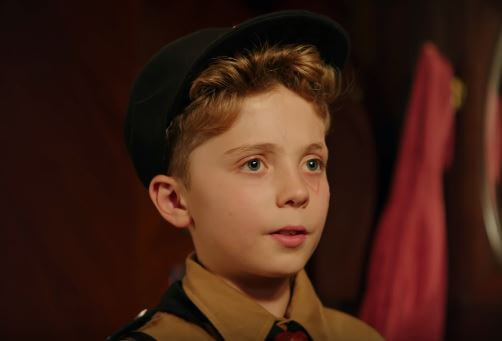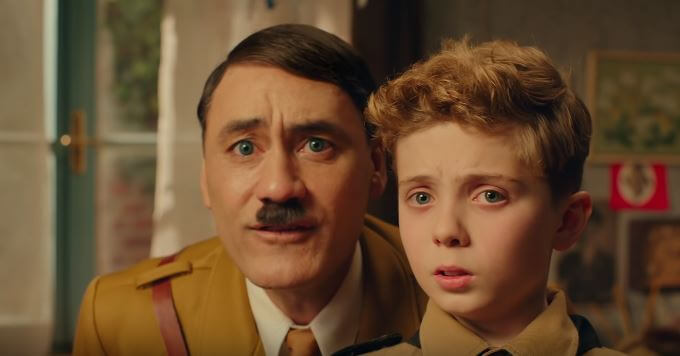Jojo Rabbit – Oscar Winning Movie – 9/10
Derived from the novel ‘Caging Skies’ by Christine Leunens, Taika Waititi’s ‘Jojo Rabbit’ is the story of a ten year old German boy named Johannes Betzler (Nicknamed Jojo) played by Roman Griffin Davis, who is obsessed with every little thing Nazi. The young boy has an imaginary friend. A child psychologist recently mentioned in an article in The Atlantic, that young boys tend to have imaginary friends who are more capable than they are, as they tend to have superpowers or in some instances are superheroes. This statement somewhat describes the situation of Jojo. This ten year old’s wild imagination has provided him with a powerful imaginary friend, who helps raise Jojo’s confidence at nerve wrecking moments, and is always ready to motivate and energise Jojo with a loud “you got this!”, this is a perfectly normal character trait for a young boys imaginary friend to have, some would even say it’s kind of cute, although Jojo’s imaginary friend is Adolf Hitler.

During the Second World War, Jojo’s dream is to be trained by the Nazi Military at the Hitler Youth Camp and hopefully become Hitler’s bodyguard in the future. In a dramatic turn of events, he finds himself in a quandary, when he comes to know that his mother Rosie Betzler played by Scarlett Johansson, has hidden a girl called Elsa played by Thomasin Mckenzie, who is of Jewish descent up in their attic. Through the cinematic journey the audience is a part of Jojo’s personal growth. Through the use of character growth, we the audience are shown the propaganda and brainwashing behaviour in one of history’s darkest times.
Some of Roman’s best moments come through with Taika Waititi, who plays the character of Adolf Hitler, Jojo’s imaginary friend. The conversations and exchanges that take place between these two characters show the extent to which children were brainwashed in the Nazi era, leaving them with nothing but blind faith and profound animosity and hatred towards people of Jewish descent. Conversations and interactions between Jojo and Rosie are compelling, showcasing how humanity is lost in the bargain. Regretfully Jojo’s knowledge is restricted to what he has been learning in school, which was that Jews are barbaric, forms of the devil and other such exaggerations.
As we get into the second hour, the film begins to explore the relationship Rosie has with her son and the friendship that forms between Jojo and Elsa, thus heightening the emotional quotient. Taika Waititi’s ingenious screenplay and direction takes the audience on a roller-coaster of contradictory emotions such as irony, laughter and a whole lot of tears. The colour palette and visual style are that of a Wes Anderson film, and this comes as a quick realisation when the Beatles Song “I want to hold your hand”, plays out in German as the film opens.
Roman Griffin Davis is incredible as JoJo as he manoeuvres the emotional range that is demanded by the character of Jojo Betzler. Scarlett Johansson is dynamic and gentle as Rosie. But through the course of the film, it is evident that there is more to her than meets the eye. Johansson delightfully conveys her state of mind as the last days of the Second World War close in. Thomasin Mckenzie puts in a great performance and her eerie presence and intensely piercing eyes will stick with you. Archie Yates, stands out as Yorki, Jojo’s only other friend with whom he shares a special bond. Archie’s calming screen presence always gives the audience hope that innocence is still not lost despite the brainwashing.
The film does not have a conspicuous antagonist apart from the spirit of Nazism. The closest to a villain is Stephen Merchant as an investigating Gestapo agent, Captain Deertz. Whose quick appearance ranges from comical to intense very quickly. Deertz, who suspects Rosie of anti-national activities, comes to Rosie’s and Jojo’s home with a few other agents, all of them greet Jojo and several other characters with individual, exaggerated “Heil Hitler” salutes, one by one. Throughout the scene the phrase loses its meaning due to the comedic repetition which are shot in long, painfully awkward group shots. That being said, when Elsa enters the room and is forced to blend in and heil all the agents, the phrase immediately gets back its ferocity as it carries immense pain for the young Jewish girl.
Creating a World War II comedy drama that expects laughs about one of the greatest monsters of history is a big gamble, even for the likes of Waititi. But through the use of humour, he illustrates how easily fascism feeds off human flaws. The tonal shift in the film occurs when the focus is no longer on the commonplace but rather on the brutal horrors of the situation.
With regards to the trailers of Jojo Rabbit, it is not the film Disney is selling. Yes, the trailers do cover the premise about a young Nazi boy who finds a Jewish girl hiding out in his house, however, they do not quite convey the film’s tone or emotional scope, which for me is why the film is so spectacular. I would not really call this film a satire. Yes, the imaginary Hitler is hilarious and extraordinary. He tends to speak with modern affects at a rapid pace and is barely different from Waititi’s New Zealand accent. Waititi, who wears blue contact lenses for the role, is a filmmaker of Jewish and Maori descent, and therefore is familiar with white supremacy. It definitely is Waititi’s strong point to pinch at vulnerabilities.

While ‘Jojo Rabbit’ is a coming of age film, it hits you hard and makes for an overpowering cinematic experience. The film is an incisive, empathetic and intimate portrait of isolation and the ways an individual’s agony can be made to intersect with violence and ideology. The film is balletic, appealing and bizarre, and despite that it manages to tackle social despair in such a beautiful way. The spirit of the movie is warm and the intelligent filmmaking is revitalizing to inspire a strong objection.
Ultimately, ‘Jojo Rabbit’ is a fantastic film. Hence, why I have chosen to give it the rating of 9 out of 10. It’s filled with strident energy and ranges across the emotional spectrum with precision. It starts out as an extremely amusing comedy, before slowly showcasing a compassionate story of a fearful young boy in a world much larger than himself, divided between forces of love and hate, which is still beyond his comprehension. It’s the work of a madman, taking aim at harmful ideologies by exposing their biggest recruitment tools: loneliness and insecurity. The film does not use love to fight hate but in fact uses love to fight the feeling of being unloved, rejected and unwanted.
The World of Movies Rating 09/10
Movie Title: Jojo Rabbit
Directed by: Taika Waititi
Written by: Taika Waititi
Main Cast: Roman Griffin Davis, Thomasin McKenzie, Taika Waititi, Rebel Wilson, Stephen Merchant, Alfie Allen, Sam Rockwell, Scarlett Johansson and Archie Yates.
Year of Release: 2019
Genre: Comedy, Drama, War
Country of Origin: New Zealand, Czech Republic and USA
Languages: English and German
Running time: 108 Minutes
Production Company: TSG Entertainment, Piki Films, Defender Films, Czech Anglo Productions, Fox Searchlight Pictures
Distributed by: 20th Century Fox, Walt Disney Studios Motion Pictures, Odeo, Big Pictures 2 Films
Image Source: Screenshots taken from the movie.
Reviewed by: Rahul Khater
